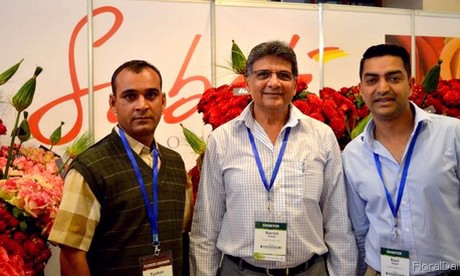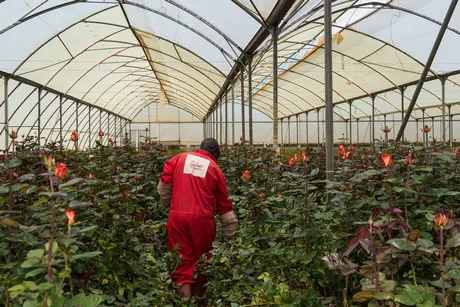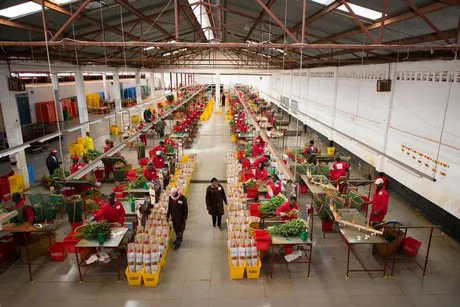
Tushar Vyas, Naren Patel and Ravi Patel of Subati Flowers at the IFTEX in Nairobi, Kenya.
Change in export markets
"Still, 30-40% of our flowers go to Eastern Europe, but we are trying to enter the Australian market." says Patel. Subati Flowers supplies 25 countries all over the world. Their main market was Russia, but, as said earlier, they recently started to focus more on Australia and the Middle East. "Luckily, the big head roses are as popular in Australia as they are in Russia. The Australians, however, do not like the spray roses as much as the Russians, but fortunately this popularity is on the rise," says Patel.

The single head roses of Subati Flowers.
Another important market for Subati Flowers is the Middle East. They have already been supplying this market for 6-7 years, but are now increasing their volumes to this market. However, according to Patel it is a difficult market, "They prefer cheaper roses, so the quality is also less important. For us, as we invest in high quality it is sometimes difficult to sell our flowers for a reasonable price," he says. "Fortunately, this market is also changing and they are increasingly preferring the higher quality, and therefore more expensive flowers."
Direct supply
Subati Flowers supplies 100% of the production directly to the customers. This offers advantages, but also disadvantages. "An advantage is, that you can sell your flowers for a better price and can plan your budgets. A disadvantage is the fact that it is not always guaranteed that you will sell your flowers. Besides that, you have to deal with a lot of different customers, so also different payments. This involves more risks."

The packaging area of Subati Flowers.
Importance of trends
"In order to stay on top of the market, it is important to stay up to date regarding the current trends and preferences of the customers," says Patel. According to Patel, the preferences of these customers regarding roses are changing. "The cluster roses are quite popular and we see an increase in demand for scented roses. These roses require different marketing and sales strategies. As we supply the direct market, this is very important to us."
Subati Flowers
Currently, Subati Flowers grows 100 different varieties of spray and single head roses. These roses are grown in soil and on hydroponics in a 75ha sized plastic greenhouse at an altitude of 2,200m above sea level.The farms are located in Northern Kenya on the slopes of the Great Rift Valley. They are expanding the greenhouse, which will have a size of 85ha at the end of this year. Then, the production will also increases from 60 million stems a year to 70-80 million stems a year.
For more information

Subati Flowers Ltd
Ravi Patel
Email: [email protected]
www.subatiflowers.com
